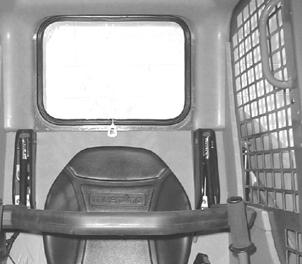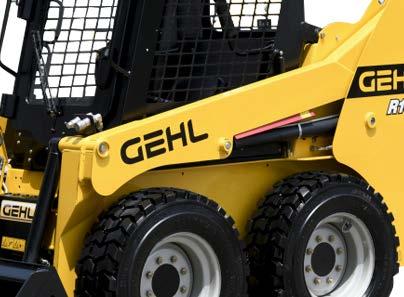
3 minute read
CONTROLS AND SAFETY EQUIPMENT
CAUTION
Become familiar with and know how to use all safety devices and controls on the skid-steer loader before operating it. Know how to stop loader operation before starting it. This .... loader is designed and intended to be used only with a GEHL attachment or a GEHL-approved referral attachment or accessory. GEHL cannot be responsible for operator safety if the loader is used with a non-approved attachment.
Guards and Shields
Whenever possible and without affecting loader operation, guards and shields are provided to protect against potentially hazardous areas. In many places, safety decals are also provided to warn of potential hazards and/or to display special operating procedures.
Read and thoroughly understand all safety decals on the loader before operating it. Do not operate the loader unless all factory-installed guards and shields are properly secured in place.
WARNING
Operator Restraint Bar
Lower the restraint bar after entering the operator’s compartment. The restraint bar is securely anchored to the ROPS. The restraint bar switch is wired in series with the seat switch forming an interlock for the lift arm, tilt, drive and starter circuits (refer to the Safety Interlock System topic on page 18 for more information).
WARNING
Never defeat the operator restraint bar or seat switch electrically or mechanically. Always wear your seatbelt.
Operator’s Seat
The seat is mounted on rails for backward or forward repositioning. A spring-loaded latch handle activates the seat adjustment mechanism.
Suspension seat (optional): A weight adjustment knob is provided with this seat for operator comfort.
Upper-Torso Restraint
1. Restraint Bar
2. Seatbelt
3. Seat Adjustment Level
ALWAYS wear the upper-torso restraint when operating skid-steer.
The seat belt should always be fastened during operation.
Important: Inspect the seat belt(s) for damage before use, and replace if damaged. Keep seatbelt(s) clean. Use only soap and water to wash seat belt(s). Cleaning solvents can cause damage to seatbelt(s).
Safety Interlock System
NEVER defeat the safety interlock system by mechanically or electrically bypassing any switches, relays or solenoid valves.
WARNING
An interlock system is used on the loader for operator safety. Together with solenoid valves, switches and relays, the interlock system:
Prevents the engine from starting unless the operator is sitting on the seat and the operator restraint bar is down.
Disables the lift arm, attachment tilt and wheel drives when the operator leaves the seat, turns the keyswitch to OFF or raises the restraint bar.
Disables auxiliary hydraulic system when the restraint bar is raised or the keyswitch is OFF.
Testing the Safety Interlock System
Before leaving a parked machine, check the safety interlock system for proper operation:
Restraint Bar
With the engine running, raise the restraint bar. Move each of the controls. There should be not more than a slight movement of the lift arm, attachment and machine. If there is any significant movement, troubleshoot and correct the problem immediately. Contact your dealer if necessary.
Seat Switch
With the engine off and the restraint bar lowered, unfasten the seatbelt. Lift your weight up off the seat. Try to start the engine. If the engine starts, turn off the engine, and troubleshoot and correct the problem. Contact your dealer if necessary.
ROPS/FOPS
The ROPS/FOPS (Roll Over/Falling Object Protective Structure) is designed to provide protection for the operator from falling objects and in case the loader tips or rolls over, provided the operator is secured inside the ROPS by the seatbelt and restraint bar.
Warning
Parking Brake
Never operate the loader with the ROPS/FOPS removed or locked back.
This skid-steer loader is equipped with a spring-applied hydraulic-released parking brake. The parking brake engages when the operator lifts the restraint bar, leaves the operator’s seat or shuts off the engine. The brake can also be applied manually by using the switch located on the right control panel of the ROPS. The red indicator on the switch lights when the parking brake is applied.
Rear Window Emergency Exit
The ROPS rear window has three functions: noise reduction, flying objects barrier and emergency exit.

To use the emergency exit, pull on the yellow warning tag at the bottom of the window and remove the seal. Push out the window and exit.
Lift Arm Support Device
The lift arm support device on the left lift cylinder is used as a cylinder lock to prevent the raised lift arm from unexpectedly lowering. Be sure to engage the support device when the lift arm is raised for service. When the support device is not being used, store it under the lift arm using the lock pin. The support device is a safety device that must be kept in proper operating condition at all times. The following steps ensure correct usage:
WARNING The safest method of engaging the lift arm support device requires two people – one person inside the loader and another person to engage the support device. Note: With the keyswitch OFF and the solenoid valve working, the lift arm will stay raised when the lift control is moved to lower the lift arm. If the valve does not hold the lift arm and it begins to lower, do not leave the operator’s compartment. Instead, have someone store the support device for you. Then, contact your GEHL dealer immediately to determine why the lift arm lowers while the keyswitch is OFF.






